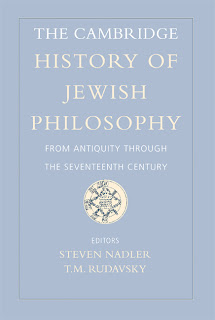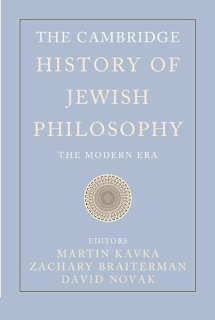Willi Goetschel: "Spinoza's controversial place in the history of Jewish philosophy"
Weer zie ik aanleiding in een bespreking die heden op de NDPR verschijnt een boek te signaleren; of eigenlijk twee. En het is vanwege de hoge prijzen van de turven vooral voor instellingsbibliotheken, maar toch… ik kan nog op iets interessants wijzen.
 In 2008 kwam uit:
In 2008 kwam uit:
Steven Nadler & T. M. Rudavsky (eds.), The Cambridge History Of Jewish Philosophy: From Antiquity Through The Seventeenth Century, Cambridge, UK: Cambridge University Press, 2008] [waarin Amazon 64 hits op Spinoza laat zien - uiteraard].
Afgelopen zomer verscheen het tweede deel:

Martin Kavka, Zachary Braiterman & David Novak (eds.), The Cambridge History Of Jewish Philosophy: The Modern Era (Volume 2), Cambridge University Press, 2012, 891pp., ISBN 9780521852432.
Een van de redacteuren, Zachary Braiterman, liet op een blog weten dat 't "many, many years in the making" was en dat het wat de hedendaagse praktijk betreft gaat om “the practice of contemporary Jewish philosophy as currently constituted in the United States.”Beide delen zijn georganiseerd op thema’s, niet zozeer op personen. Dit werk wordt vandaag op NDPR besproken door Jeffrey A. Bernstein. Ik citeer daaruit de volgende passage:
"Willi Goetschel shows how Baruch Spinoza and Moses Mendelssohn, in their inaugurations of modern Jewish thought as a praxis, sought to blur the easy lines between tradition and innovation: "the radical edge of Spinoza's point is not that tradition should be banned as evil and nefarious, but . . . that tradition from the beginning represents the performance of its own reinvention" (53). Differently stated, tradition is, in fact, simultaneously transmission and transformation; this is what allows for unity and recognition over time as well as adaptation to new contexts: "Mendelssohn's conception of Judaism is thus both traditional and innovative as it suggests that to preserve tradition is only possible by actualizing it, which, in turn, requires an interpretive hermeneutic process itself constitutive to the production of meaning" (66). That said, it is most definitely not the case that such production occurs ex nihilo."
Graag wijs ik erop dat de uitgever, naast de uitvoerige inleiding van de organiserende redacteur Martin Kavka, ook het eerste hoofdstuk “Enlightenment” van Willi Goetschel in z’n geheel laat lezen met daarin een uitvoerige paragraaf over “Spinoza's controversial place in the history of Jewish philosophy”. Nog voor ik dit zelf geheel gelezen heb, laat ik dit hier graag weten. [cf hier]

